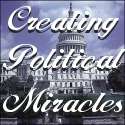On April 19, 1775 British troops marched out of Boston on what would these days be spun in the Democrat-Media Complex as an exercise in gun control "for their own good." But colonial militia and farmers fought for their rights rather than hand over their gun powder. The British retreated to Boston severely bloodied. Lives were lost. It seemed there might now be two sides unmistakably at war.
On June 14, 1775 the Second Continental Congress voted to create a Continental Army. George Washington was asked to travel up to the Boston area to attempt with his southern accent to take command of New England militia units. But 3 days later on June 17, 1775, before Washington could make it up north, the battle we know as "Bunker Hill" raged and the British overran colonial freedom fighter positions with shock and awe force.
Eventually George Washington's hard-working troops did manage to influence the British to relocate somewhere else besides Boston for tactical reasons. But British military leaders were still supremely confident they could put down the resistance movement of the colonial rebels. In the British military mind, George Washington's tiny under-trained, under-equipped army would quickly be brushed away like crumbs from their tea tables. By the end of 1775 there was no guarantee that any substantial number of colonists in America would even endure hardship, never mind "fight to the death," for the radical idea of independence from England. In America there lived many more system-supporting Tories than liberty-craving Patriots.
But as the spirit of liberty would have it, Thomas Paine's fiery pamphlet "Common Sense" was published in January 1776 ... and the inequality gap between down-to-earth American humility and elitist British arrogance became almost impossible to excuse. Paine's pamphlet enjoyed the largest relative circulation and readership in American history and gave backbone to what we call the American Revolution. Patriots were still outnumbered, but now they felt the spirit as never before.
Fast forward to the 21st Century and modern Americans have more reason for grievance regarding their present government than colonists in the 18th Century had with the British government of the time. Americans today can find the same spirit by being excited about the American Revolution and reading as many works as possible related to the original patriots, especially Thomas Paine's "Common Sense." But more than that, we really need something to fire up Americans, maybe something similar to Paine's inspiring pamphlet only up to date for these days, wouldn't you say?
Perhaps hoping to meet that need, Stephen D. Palmer published a small book entitled "Uncommon Sense: A Common Citizen's Guide to Rebuilding America." Well, okay ... it's not the fiery prose of Thomas Paine, but it is a quick easy-to-understand read that (if you care enough to share) can raise your neighbor's focus above the insane ideas which rule today's American politics and into a realm of satisfying solutions you will know to be right by your own common sense.
To really understand the evil psychology of modern "liberal progressives," read Ayn Rand's entire novel "Atlas Shrugged"

"God's laws will keep your minds at peace, because peace IS His Will, and His laws are established to uphold it. His are the laws of freedom, but yours are the laws of bondage. Since freedom and bondage are irreconcilable, their laws CANNOT BE UNDERSTOOD TOGETHER. The laws of God work only for your good, and there ARE no other laws beside His. Everything else is merely lawLESS, and therefore chaotic." -Jesus Christ in A Course in Miracles












Post a Comment